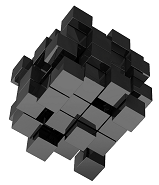 |

|
Content Owner: Herman Rutten | ||||
Summary
Built-in (native)
External (vSAN Certified)
External (vSAN Certified)
Details
vSAN 7.0 U1 has integrated file services. vSAN File Services leverages scale-out architecture by deploying an Agent/Appliance VM (OVF templates) on individual ESXi hosts. Within each Agent/Appliance VM a container, or “protocol stack”, is running. The "protocol stack" creates a file system that is spread across the VMware vSAN Virtual Distributed File System (VDFS), and exposes the file system as an NFS file share. The file shares support NFSv3, NFSv4.1, SMBv2.1 and SMBv3 by default. A file share has a 1:1 relationship with a VDFS volume and is formed out of vSAN objects. The minimum number of containers that need to be deployed is 3, the maximum 32 in any given cluster. vSAN 7.0 Files Services are deployed through the vSAN File Service wizard.
vSAN File Services currenty has the following restrictions:
- not supported on 2-node clusters,
- not supported on stretched clusters,
- not supported in combination with vLCM (vSphere Lifecycle Manager),
- it is not supported to mount the NFS share from your ESXi host,
- no integration with vSAN Fault Domains.
The alternative to vSAN File Services is to provide file services through Windows guest VMs (SMB) and/or Linux guest VMs (NFS) on top of vSAN. These file services can be made highly available by using clustering techniques.
Another alternative is to use virtual storage appliances from a third-party to host file services on top of vSAN. The following 3rd party File Services partner products are certified with vSAN 6.7:
- Cohesity DataPlatform 6.1
- Dell EMC Unity VSA 4.4
- NetApp ONTAP Select vNAS 9.5
- Nexenta NexentaStor VSA 5.1.2 and 5.2.0VM
- Panzura Freedom Filer VSA 7.1.9.3
However, none of the mentioned platforms have been certified for vSAN 7.0 or 7.0U1 (yet).
vSAN File Services currenty has the following restrictions:
- not supported on 2-node clusters,
- not supported on stretched clusters,
- not supported in combination with vLCM (vSphere Lifecycle Manager),
- it is not supported to mount the NFS share from your ESXi host,
- no integration with vSAN Fault Domains.
The alternative to vSAN File Services is to provide file services through Windows guest VMs (SMB) and/or Linux guest VMs (NFS) on top of vSAN. These file services can be made highly available by using clustering techniques.
Another alternative is to use virtual storage appliances from a third-party to host file services on top of vSAN. The following 3rd party File Services partner products are certified with vSAN 6.7:
- Cohesity DataPlatform 6.1
- Dell EMC Unity VSA 4.4
- NetApp ONTAP Select vNAS 9.5
- Nexenta NexentaStor VSA 5.1.2 and 5.2.0VM
- Panzura Freedom Filer VSA 7.1.9.3
However, none of the mentioned platforms have been certified for vSAN 7.0 or 7.0U1 (yet).
